|
|
|
Sort Order |
|
|
|
Items / Page
|
|
|
|
|
|
|
| Srl | Item |
| 1 |
ID:
060927
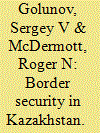

|
|
|
| 2 |
ID:
130024
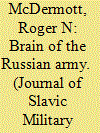

|
|
|
|
|
| Publication |
2014.
|
| Summary/Abstract |
Following the Russia-Georgia War in August 2008, Russia's conventional Armed Forces were subjected to a far reaching and unpredictable reform. Although the Armed Forces were long overdue reform, previous efforts rapidly failed for a variety of reasons including institutional inertia, in-fighting within the military elite and a lack of consensus on the goals and targets of such reform. The reforms of 2008-12 were therefore unprecedented since the creation of Russia's Armed Forces in 1992 following the disintegration of the USSR in late 1991; major changes were actually implemented. Yet, the reforms that followed were haphazard, poorly implemented and frequently experienced setbacks, reversals and an overall lack of coordinated policy efforts. These issues are examined in the following paper, exploring the roots of Russian defense planning weaknesses, and the numerous policy zigzags of the reforms to the structure of the Armed Forces, officer downsizing, NCO development and many other issues within a political-military culture that actually mitigates time-phased and fully worked-out planning cycles. Moscow's blindness to the utility of reliable military statistics will ensure continued 'blind planning' and institutional guesswork until obsessive secrecy and state level corruption give way to more scientific approaches to forming, implementing and managing such strategic level change within the country's defense and security structures.
|
|
|
|
|
|
|
|
|
|
|
|
|
|
|
|
| 3 |
ID:
056397


|
|
|
| 4 |
ID:
099110
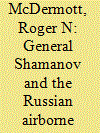

|
|
|
|
|
| Publication |
2010.
|
| Summary/Abstract |
The elite Russian airborne forces, unlike other structures within the conventional armed forces, survived the "new look" reform initiated by Defense Minister, Anatoliy Serdyukov in October 2008, relatively unscathed. How this was achieved, what it meant for reform planning as a whole, as well as the significance of the change to its leadership in 2009 is examined. Problems facing the airborne units are perhaps not as intense as in the ground forces, though its leadership struggled to protect key aspects of its essential requirements in order to conduct adequate combat training. However, its successful preservation of the division-based structure, more than any other development in the past two years, illustrates the enduring potential for the defense ministry to reconceptualize the original reform concept in response to service or branch of service interests.
|
|
|
|
|
|
|
|
|
|
|
|
|
|
|
|
| 5 |
ID:
087666


|
|
|
|
|
| Publication |
2009.
|
| Summary/Abstract |
This article discusses the status and recent evolution of Georgian intelligence agencies, and in particular how well they have performed with respect to the Russian challenge since President Saakashvili assumed power in 2004. The article also discusses Georgian intelligence with respect to its international engagement, and recommends options for NATO that would assist Georgia in reforming and professionalizing its intelligence agencies along the lines of advanced or more mature democracies.
|
|
|
|
|
|
|
|
|
|
|
|
|
|
|
|
| 6 |
ID:
137281


|
|
|
|
|
| Summary/Abstract |
This study inquires whether the United States and Russia might be headed toward a new Cold War, at least with respect to certain aspects of their diplomatic-strategic behavior. Those aspects have to do with missile defenses, nuclear arms control, and conflict in cyberspace. Arguments pertinent to these three domains or issues are not necessarily transferable, as interpretations of trends in U.S.-Russian relations, to other aspects of their diplomacy and national security affairs. For example, one cannot necessarily infer the outcome of Russian-American relations over Syria, Ukraine, or Afghanistan based on prevailing tendencies in nuclear arms control or cyber war. Nevertheless, the examination of missile defenses, nuclear arms control, and cyber conflict may yield important insights about near- and longer term prospects, because: (1) each of these issues has been identified by both states as a matter of vital national security interest; (2), each issue offers a challenging mix of technical judgments and policy prescriptions; and (3) U.S.-Russian cooperation is a necessary condition for amelioration of the security risks in each of these issue domains, as well as in their possible areas of overlap.
|
|
|
|
|
|
|
|
|
|
|
|
|
|
|
|
| 7 |
ID:
148989
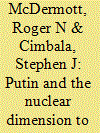

|
|
|
|
|
| Summary/Abstract |
Nuclear weapons and nuclear strategy have found themselves as parts of the discussions among expert and other commentators about the future of Russian President Vladimir Putin and about Russia’s military-strategic options in Europe following its annexation of Crimea and destabilization of Eastern Ukraine. This study considers some of the nuclear-related aspects of Putin’s and Russia’s survivability with respect to: (1) principal challenges for NATO in the face of improving Russian military capabilities and plausible strategies, (2) the future relationship between Russia’s conventional military and nuclear capabilities and military-strategic priorities, and (3) assessment of Russia’s threat perceptions in the context of its ‘strategic history’.
|
|
|
|
|
|
|
|
|
|
|
|
|
|
|
|
| 8 |
ID:
092902
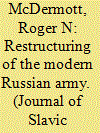

|
|
|
|
|
| Publication |
2009.
|
| Summary/Abstract |
The breathtaking level of unprecedented change within the Russian armed forces, first announced in the aftermath of the Russia-Georgia war in August 2008, not only proved rapid and quite unlike any of the failed reform attempts since 1992, but it caught many in the West and Russia unawares. While many concentrated on the proposed downsizing of the officer corps, which planned to axe 205,000 officers in order to maximize efficiency, a yet greater changed quietly and systematically implemented in the course of 2009 went almost unnoticed in the West; yet its policy implications will compel western governments to reassess their relations with Russia and their understanding of Russia's defense posture. In short, the mass mobilization principle, which had hitherto defined the Russian military, passed quietly into history, as the division-based structure within the table of organization was steadily and completely replaced by a new brigade-based structure.
|
|
|
|
|
|
|
|
|
|
|
|
|
|
|
|
| 9 |
ID:
171681


|
|
|
|
|
| Summary/Abstract |
The article seeks to explore the evolving defense relationship between Russia and China in the context of nuclear policy doctrine. There are multiple studies of nuclear doctrine in relation to each country, yet this article tries to connect them in the sense of consiring the possible influence of Moscow’s nuclear doctrine on Beijing. In doing this, the author examines the nature of the growing ‘strategic partnership’ between Russia and China to include tracing its origins, limits, and ambiguity and the speculative question of an emerging ‘de facto alliance’. It outlines the growth in military-to-military contacts, developing joint military exercises both bilateral and multilateral, as well as Moscow’s decision to involve China in its annual strategic level military exercises, contrasting Vostok 2010 and Vostok 2018. Indeed, there is a policy perception in Western government circles, particularly in the United States, that should war erupt with Russia that the latter will find itself alone; this is certainly open to question and potentially a dangerous oversight in Washington policy circles, as well as among its allies. The article also raises important questions concerning Moscow’s continued adherence to the undeclared nuclear policy of ‘escalate-to-de-escalate’ and its further strengthening of the conventional level of ‘pre-nuclear’ deterrence. In essence, this article raises questions of interest in the policy and scholarly communities, rather than proving concrete conclusions.
|
|
|
|
|
|
|
|
|
|
|
|
|
|
|
|
| 10 |
ID:
067617


|
|
|
|
|
| Publication |
London, Routledge, 2003.
|
| Description |
xxiv, 332p.
|
| Series |
Cass series on Soviet (Russian) military institutions: 4
|
| Standard Number |
0714654752
|
|
|
|
|
|
|
|
|
|
|
|
Copies: C:1/I:0,R:0,Q:0
Circulation
| Accession# | Call# | Current Location | Status | Policy | Location |
| 050885 | 355.0094709049/ALD 050885 | Main | On Shelf | General | |
|
|
|
|
| 11 |
ID:
130023
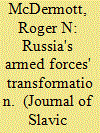

|
|
|
|
|
| Publication |
2014.
|
| Summary/Abstract |
Since the creation of the Armed Forces of the Russian Federation in 1992, the Kremlin has grappled, struggled or even procrastinated on addressing the question of what type of force structure may best suit the state's security environment. A number of initiatives frequently represented as 'reform' have come and gone, falling by the wayside due to internal inertia, institutional resistance to root and branch reform or, indeed, as a result of the political-military elite failing to come to terms with the disintegration of the Soviet Union. Transitioning from the Soviet legacy force to something more akin to the forces needed to protect the Russian state and adapt to the modern warfare environment to meet a number of differing challenges ranging from counterinsurgency to peacekeeping or dealing with an unforeseen military crisis plagued Moscow's defense planning.
|
|
|
|
|
|
|
|
|
|
|
|
|
|
|
|
| 12 |
ID:
088703


|
|
|
| 13 |
ID:
093944


|
|
|
|
|
| Publication |
2010.
|
| Summary/Abstract |
Despite the manifold problems in Russian Defense Minister Anatoliy Serdyukov's radical reform agenda, there is clear evidence that such a program is being implemented regardless of opposition from those in uniform, especially on the General Staff. It is no exaggeration to suggest that depending on how fully it is implemented, this reform could have an impact on the lives of all Russian officers no matter where they serve now. The mass mobilization principle has been abandoned and the transition from a division-based system to the new brigade structure is complete. Meanwhile, despite careful planning by the General Staff, we do not believe the Russian military will emerge as a modern fighting force until 2020, if then. Budget cuts, production inefficiencies, poor maintenance and sloppy work will all inhibit the construction of a modern Russian army.
|
|
|
|
|
|
|
|
|
|
|
|
|
|
|
|
| 14 |
ID:
159546
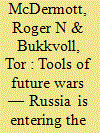

|
|
|
|
|
| Summary/Abstract |
Conventional high-precision weapons play an increasingly important role in the defense of Russia. They may also in the future be important in bilateral conflicts where Russia wants to force its will through. In general, the Russian debate on these weapons is more preoccupied with defensive than offensive scenarios. However, there are also those who argue that (a) conventional high-precision weapons are likely to increase the role of military force in foreign policy generally around the world; (b) for Russia they may be particularly efficient in conflicts with highly developed states, since these states are especially vulnerable because of their high concentration of critical stationary installations; and (c) these weapons may be particularly efficient in combination with other military capabilities.
|
|
|
|
|
|
|
|
|
|
|
|
|
|
|
|
| 15 |
ID:
129248


|
|
|
| 16 |
ID:
085239
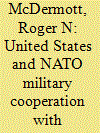

|
|
|
|
|
| Publication |
2008.
|
| Summary/Abstract |
Since the formation of Kazakhstan's armed forces in the early 1990s, western countries have taken an increasingly active interest in providing military cooperation aimed at enhancing Kazakhstan's defence capabilities. This process was intensified in the aftermath of the terrorist attacks on the United States on 11 September 2001 with Kazakhstan emerging as an important partner within Central Asia in the Global War on Terrorism. The United States, Turkey, U.K. and France have developed security assistance programmes with Kazakhstan, while the latter is also seeking to further diversify its bilateral military cooperation with other western countries as well as deepening its partnership with the NATO alliance.
|
|
|
|
|
|
|
|
|
|
|
|
|
|
|
|
|
|
|
|
|